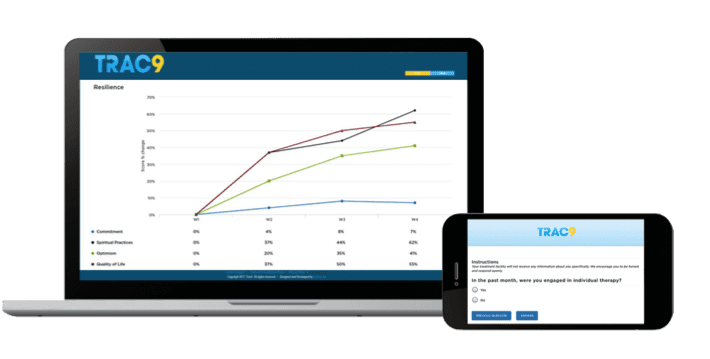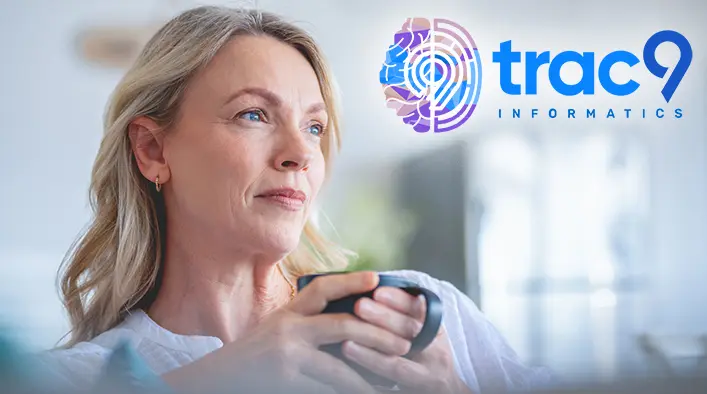Trac9
Measuring and Tracking Patient Outcomes
We live in a data-driven world. It seems that everything today is tracked, measured, and quantified. And this is for good reason – because without measurement, how can we know what we are doing is working or see our progress?
While anecdotal evidence of a program working may be enough for some, it’s not for us. That’s why we work with Trac9 Informatics – a leader in clinical evaluation and assessments. The team at Trac9 Informatics is committed to improving the lives and clinical outcomes for those in treatment for mental health and substance use disorders through evidence-based science.


Through a secure web app, Trac9 uses a series of standardized assessments to identify changes in things like:
- Depression
- Anxiety
- Stress
- Visual response to cravings
- Verbal response to cravings
- Spirituality
- Commitment to sobriety
- Optimism
- Quality of life

How Does Trac9 Help With Continued Recovery?
Trac9 assessments are confidentially collected as needed (typically weekly) to track the user’s responses. These responses predict the likelihood of a relapse. The results are charted in an easy-to-read graph that shows the client’s progress and/or the need for additional recovery work. When responses seem to predict relapse, the client’s clinician will be automatically notified if a follow-up is needed.
Trac9 creates a better way for facilities to stay in touch with their clients long after discharge. This ongoing relationship creates accountability for both the client and the treatment center. By measuring the success of their clients or the need for additional care, facilities can develop best practice tools that lead to measurable, positive outcomes.
Trac9 Highlights
- Real-time monitoring of the client’s progress
- Instant alerts are sent to the treatment team if the client’s symptoms increase
- The facility’s clinical director monitors the quality of care for all clients
- Monitoring of clients’ satisfaction with treatment
- Monitoring of symptoms and protective factors that promote recovery
- 12 monthly follow-ups after the client discharges from treatment
- Real-time monitoring for each of our locations
- Computer analysis that allows for the identification of high-risk patients
Trac9 FAQ
Are my questionnaire answers confidential?
Absolutely. All data we collect is protected health information and will be handled according to the HIPAA Privacy Rules.
How long do assessments take?
On average, it takes only about 13 minutes to complete the in-treatment survey. Most can complete the post-treatment survey in less than five minutes.
How will you use my assessment data for treatment?
Data collected while in-treatment helps us assign counselors that best fit a client’s needs, create an individualized treatment and aftercare and even advocate with insurance companies on a client’s behalf. Post-treatment data helps us monitor long-term treatment success and gives clients a direct option to reach out if they feel they are struggling.
What will my answers be used for besides guiding my treatment?
In-treatment and post-treatment data helps us measure the effectiveness of our treatment program and improve treatment for others following in your footsteps. Your input can help advance the science of addiction medicine and that is a great legacy.
Trac9 Developers
Dr. Kitty Harris Wilkes serves as President of NLW Partners, which is dedicated to consulting, education, science, and research for addiction recovery. She is a noted author and public speaker, and presents at national conferences, workshops, and seminars on topics including adolescence; collegiate addiction and recovery; and communication, civility, and leadership. She served for twelve years as the Director of the Center for the Study of Addiction and Recovery (CSAR) at Texas Tech University. Under her leadership, the CSAR gained national attention, appearing in the Wall Street Journal, on the NBC Today Show, and on CNN, and being featured in The Chronicle of Higher Education, Inside Higher Ed, and The New York Times. Dr. Harris is the author of Women and Recovery-Finding Hope, published by John Wiley & Sons, Inc. and co-editor of Substance Abuse Recovery in College, published by Springer.
Jared P. Dempsey, Ph.D., serves as Chief Scientist at NLW Partners. Dr. Dempsey is actively involved in neurological and physiological research in addiction. Recent publications include preliminary evidence for a biological marker of addiction recovery, non-conscious emotional response to drug stimuli, and the influence of social anxiety on addiction treatment. Dr. Dempsey has also served as an expert reviewer for the Journal of Motivation and Emotion, Psychopharmacology, Journal of Psychopathology and Behavioral Assessment, American Journal on Addictions, Addiction, Psychiatry Research, European Psychiatry, Nicotine and Tobacco Research, and the Journal of Studies on Alcohol and Drugs. Dr. Dempsey was also actively involved in the development of a comprehensive symptom tracking and outcome data collection tool for addiction treatment, Trac9.